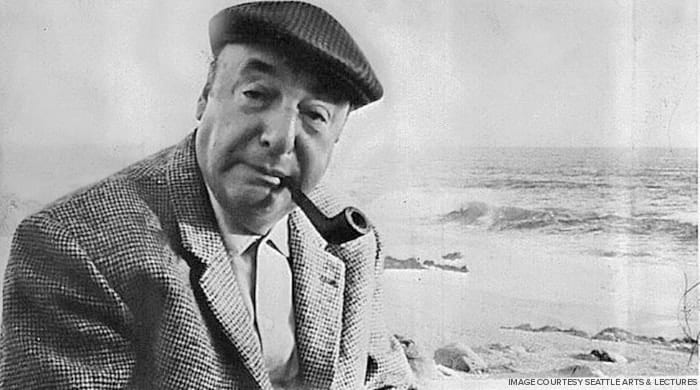
Visible and Touchable: Pablo Neruda on Interpretation, Practicality, and the Will to Write
May 23, 2016
By Elijah Brooks, SAL Intern
The virtual world has become an inescapable part of modern life, and because of this, the wisdom of Pablo Neruda is ripe with new applicability. In a 1971 interview with Radio-Canada (originally conducted in French), Neruda admires the physical world and voices his suspicion of writing that departs from it.
When asked about various analyses of his poetry, Neruda balked at the idea of belonging to a particular school of poetry:
“I’m not looking for anything in my work, neither materialism, nor materialistic, nor historic spiritualism. I only write. The only thing I need to write is the will to write and a paper and a pencil. And all the theories that one makes about my poetry are completely external for me. If one finds philosophical connections, it’s not my responsibility. I leave the door open for all that, but in general I could say that I am materialist in the sense of visible poetry, which is to say I can’t speak or sing or write except about things that are extremely visible and touchable. If one calls that materialism, I am a materialist.”
Neruda then provides an explanation for why he writes:
“I was going to tell you that I am the oldest of poets. I want to sing about the stars, the moon, the flowers, about love, exactly like Sully Prudhomme, like Victor Hugo, or like, before all else, all the poets of all time. I don’t want to be a revolutionary in poetry; I don’t have a poetic doctrine; I don’t have a poetic ideology. I am a poet by vital, biological need, and that is my whole doctrine.”
Neruda’s choice to include love in his list of “extremely visible and touchable” subjects reveals how tangibly he sees the world. Perhaps it was this lack of poetic ideology which allowed him to write with such unrestricted clarity. Continuing, he voices his abhorrence for any kind of poetic exegesis:
“I believe that it is enough that poets only exist—it’s good that poets exist—but if to forty books by poets one adds forty thousand books of poetic interpretation, where are the poets going to live, I ask you? I am a poet in this absolutely elemental sense: I go no further in the interpretation of my poetry than my need to sing, to express myself, to regard the wonder of the world. And in the marvelousness of the world I find also cataloged the struggle of mankind for a future. For to change the destiny of humanity is a great part of life, and so I consider it.”
Pablo Neruda died on September 23rd 1973, but in both his opinions and his poetry lives an intense sincerity and a pragmatism that is refreshing for the genre. He ends this interview by reaffirming his belief in poetry that is cemented in the physical, rather than in the realm of ideas, what he calls “a very old conception of poetry”:
“I have no theory about man. I have theories on the shoes I am going to buy when mine are worn out or that my clothes are already getting threadbare. I don’t know what man is. And I am a living man, and life is not for thinking about what substantially is ‘Man,’ in that sense. Perhaps it is a thing that interests me less than the profession of a mechanic or of a geologist; that’s more important. But this interminable debate on what is man is so much talk that it doesn’t interest me. We know that we are born, and that we are going to die, etc. But between all that it’s very difficult, or it’s very easy to say things. And I have nothing to do with that; I don’t know what it’s all about. It is perhaps a realization of what is most distinguished about philosophical idealism: to discuss eternally things that have no solution. In general I am a practical poet. Poetry in a certain sense ought to be practical too. Why not? Why not practical poetry like useless poetry, why not matter, and why not dream?”